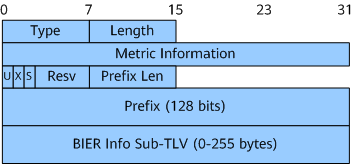IS-ISv6 for BIERv6
To forward BIERv6 packets based on a BitString, each node must first generate a BIFT. The nodes obtain the information required to generate a BIFT by using IS-ISv6 extensions designed for BIERv6, as described in Table 1.
Type |
Name |
Function |
Carried In |
|---|---|---|---|
TLV |
Extended IS Reachability TLV (IPv6) |
Advertises BFR-prefixes and floods BFR node information in a sub-domain. The BFR-prefix is a loopback interface IPv6 address of a BFR in a sub-domain. |
IS-IS packets |
Sub-TLV |
BIER Info Sub-TLV |
Advertises information such as sub-domain IDs and BFR-IDs. |
TLV (Type = 237) in IS-IS packets |
Sub-Sub-TLV |
End.BIER Info Sub-sub-TLV MPRA Info Sub-sub-TLV |
Advertises End.BIER SIDs or MPRAs. |
BIER Info Sub-TLV |
BIERv6 Encapsulation Sub-sub-TLV |
Advertises the Max SI (short for set ID), BSL, and start BIFT-ID. |
BIER Info Sub-TLV |
Extended IS Reachability TLV (IPv6)
The Extended IS Reachability TLV (IPv6) is used to advertise BFR-prefixes. Figure 1 shows its format.
Table 2 describes the fields.
Field |
Length |
Description |
|---|---|---|
Type |
8 bits |
TLV type. The value is 236 or 237. The value 236 indicates that this TLV is used if the IPv6 capability is enabled for an IS-IS process in standard topology mode using the ipv6 enable topology standard command. The value 237 indicates that this TLV is used if the IPv6 capability is enabled for an IS-IS process in IPv6 topology mode using the ipv6 enable topology ipv6 command. Currently, only the type value 237 is supported. |
Length |
8 bits |
Length. |
Metric Information |
32 bits |
Metric information of the IPv6 prefix. |
U |
1 bit |
U flag, indicating Up or Down. |
X |
1 bit |
External bit. |
S |
1 bit |
S flag, indicating whether a sub-TLV is present. |
Resv |
5 bits |
Reserved field. |
Prefix Len |
8 bits |
The value ranges from 0 to 128, and is 128 when BIERv6 information is carried. |
Prefix |
128 bits |
BFR-prefix, which is a loopback interface IPv6 address of a BFR in a sub-domain. |
BIER Info Sub-TLV |
Variable |
This field is optional and used to carry BIER information. |
BIER Info Sub-TLV
The BIER Info Sub-TLV is used to advertise information such as sub-domain IDs and BFR-IDs. Figure 2 shows its format.
Table 3 describes the fields.
Field |
Length |
Description |
|---|---|---|
Type |
8 bits |
Type. The value is 32. |
Length |
8 bits |
Length. |
BAR |
8 bits |
BIER algorithm used to calculate a path to a BFER. BIER algorithms are defined by the Internet Assigned Numbers Authority (IANA). |
IPA |
8 bits |
IGP algorithm, which can be used by the BIER algorithm defined in the BAR field. |
Sub-domain-id |
8 bits |
Sub-domain ID, which uniquely identifies a sub-domain. |
BFR-ID |
16 bits |
BFR-ID of a node in the sub-domain. If no BFR-ID is configured, 0 (invalid BFR-ID) is carried in packets. |
Sub-sub-TLV |
Variable |
This field is optional. Whether the sub-sub-TLV is present is determined by the Length field. The BIER Info Sub-TLV may include End.BIER Info Sub-sub-TLV and BIERv6 Encapsulation Sub-sub-TLV. |
End.BIER Info Sub-sub-TLV
The End.BIER Info Sub-sub-TLV is used to advertise End.BIER SIDs. Figure 3 shows its format.
Table 4 describes the fields.
MPRA Info Sub-sub-TLV
The MPRA Info Sub-sub-TLV is used to advertise MPRAs. Figure 4 shows its format.
Table 5 describes the fields.
Field |
Length |
Description |
|---|---|---|
Type |
8 bits |
The value is 3, indicating that an MPRA is carried. |
Length |
8 bits |
Length. The value is 16. |
Multicast Policy Reserved Address(MPRA) |
128 bits |
MPRA. |
Extension |
Not limited |
This field is optional and is not filled in. If a received packet contains the Extension field, this field is ignored. |
BIERv6/G-BIER Encapsulation Sub-sub-TLV
The BIERv6/G-BIER Encapsulation Sub-sub-TLV is used to advertise the Max SI, BSL, and start BIFT-ID. Figure 5 shows the format of the sub-sub-TLV.
Table 6 describes the fields.
Field |
Length |
Description |
|---|---|---|
Type |
8 bits |
If the value is 6, BIERv6 encapsulation information is carried. If the value is 2, G-BIER encapsulation information is carried. |
Length |
8 bits |
Length. |
Max SI |
8 bits |
Maximum set ID in a specific <BIERv6/G-BIER sub-domain, BSL>. |
BSL |
4 bits |
Coded value of the BitString length. The available coded values are as follows:
|
BIFT-ID |
20 bits |
This field is set to 0 during packet encapsulation and is ignored when the packet is received. This field can be considered as a reserved field. |




